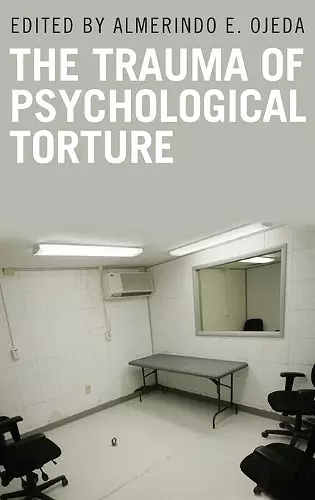The Trauma of Psychological Torture
Format:Hardback
Publisher:Bloomsbury Publishing PLC
Published:30th May '08
Currently unavailable, and unfortunately no date known when it will be back

Explains how U.S. forces, now and through history, use and have used psychological torture from mock executions to mind-altering drugs and humiliation, detailing why opposition to the techniques is growing in the U.S.
Includes a brief history of sanctioned psychological experiments and actions to torture, as well as CIA research outsourced to leading US universities. This title explains how US forces have used psychological torture and details why opposition to the techniques is growing.It is, in some circles, called No-Touch Torture. Yet it brings pain and damage that can last a lifetime. Psychological torture techniques - which have a history of use by U.S. forces globally trailing far into the past beyond Guantanamo and Abu Ghraib - include a variety of methods from mock executions, severe humiliation, and mind-altering drugs, to forced self-induced pain, sensory disorientation including loud music and light control, and exploitation of personal or cultural phobias. It is no accident, for example, that Private Lynndie England was seen in Abu Ghraib pictures, which shocked the world, with Arab prisoners forced naked into a pile or led like dogs by leash. Arabs have strong spiritual beliefs about the humiliation of public nudity, and also have a strong cultural fear of dogs. These techniques are neither surprising nor particular to England if one has fair knowledge of the U.S. history of sanctioned psychological torture techniques, say the experts behind this book. Having reached a joint crescendo of intolerance and horror, scholars from across the nation met in 2006 for a conference on psychological torture and what can be done to stop the practice. They agree with Alberto Mora, the U.S. Navy's general counsel, who fought to stop the Pentagon-sanctioned psychological torture at Guantanamo. Cruelty disfigures our national character. Where cruelty exists, law does not, Mora said. This book is the joint effort of those scholars, from the University of California Center for the Study of Human Rights in the Americas, to Harvard Medical School, to paint a clear picture of psychological torture, its longterm affects, and spur action to stop the practice. The distinctly American form of psychological torture has four characteristics that make it attractive to the CIA and other supporters, say the authors. It is elusive - lacks the clear signs of physical abuse so eludes detection and complicates investigation, prosecution, or attempts at prohibition. It is shrouded - in scientific patina that makes it appeal to policy makers and avoids the obvious physical brutality...
Psychologists interested in becoming familiar with the torture debate, particularly within APA, will find this book quite useful…The Trauma of Psychological Torture provides a useful compendium of knowledge about systematic psychological torture and coercion in the context of war and provides justification for efforts by members of APA and the American Psychiatric Association to not sanction such practices. * PsycCRITIQUES *
Each of the twelve chapters offers fresh perspective on a surprising range of issues. . . . The Trauma of Psychological Torture goes well beyond an analysis of the psychological and physiological effects of torture. . . . The range of makes this book a surprisingly panoramic work that would be a welcome read to anyone interested in gaining a better understanding of torture as it exists today. . . . The Trauma of Psychological Torture offers a helpful view of issues involving the responsibility of the medical profession, the neurobiological effects of torture, and the historical emergence of so-called 'psychological torture'—but it also provides us with an ethical demand—namely, that we think carefully about our current practices, as well as the categories we use to describe them. * Metapsychology Online *
Founding director of the Center for the Study of Human Rights in the Americas, Ojeda (linguistics, Univ. of California, Davis) merges perspectives on psychological torture from psychology, psychiatry, neuropsychology, neurobiology, history, and law…This is a comprehensive, useful addition to literature on torture…Recommended. Graduate students, researchers, faculty. * Choice *
ISBN: 9780313345142
Dimensions: unknown
Weight: 510g
240 pages